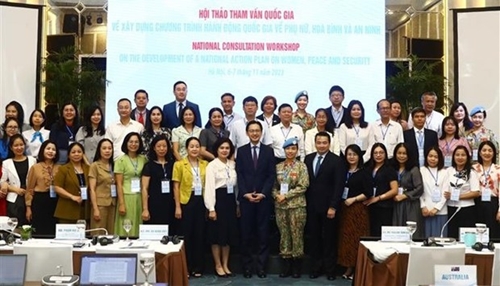    |
 |
|
Deputy Foreign Minister Do Hung Viet (middle, front) and delegates at the conference |
Deputy Foreign Minister Do Hung Viet underlined that the introduction of the U.N. Security Resolution 1325 in 2000 marked the birth of the WPS agenda with two major objectives of better ensuring the rights of women and girls, and promoting women's participation in all stages of conflict settlement and peace building process.
According to Viet, so far, the agenda has become an important framework and a foundation for the mobilization of resources and organization of actions, supporting women amid conflicts and crises, helping them better protect their rights and more effectively promote their role in society.
Deputy FM Viet underscored that in Vietnam, women have made great contribution to the cause of national construction and defense. Currently, many officials, entrepreneurs and U.N. peacekeepers of Vietnam are women, he added.
Prioritizing the promotion of women’s role in maintaining peace and international security have been affirmed right from Vietnam’s first participation in the U.N. Security Council in the 2008-2009 tenure, he said.
Vietnam left an important imprint by pushing for the U.N. Security Council's adoption of Resolution 1889 (2009) on the role of women and girls in post-conflict context, which is considered one of the four fundamental resolutions of the council’s WPS agenda.
Vietnam has been one of the countries with a high rate of women joining U.N. peacekeeping operations at 16%, much higher than the U.N.’s average rate of 4%, noted Viet.
He recalled that in 2020 in Hanoi, Vietnam successfully hosted an international conference commemorating the 20th anniversary of the U.N. Security Council’s Resolution 1325, during which the Hanoi Commitment to Action was adopted with the co-sponsorship of 75 countries, calling for the building of NAPs on WPS.
However, the official said that there are many challenges in the path of realizing the goal of gender equality in general and the WPS agenda in particular, as Vietnamese women have still faced many war consequences and Vietnamese women and girls’ contribution to families and community have yet to be fully recognized.
Therefore, the country’s building of the NAP on WPS has significant meanings in the current context, reaffirming the country’s strong commitments in the international community’s joint efforts to promote this agenda, said Viet.
He said the NAP is expected to supplement and complete the policy framework on gender equality and women empowerment. Particularly, it will be the first comprehensive framework for this aspect in the field of peace and security, with specific goals and solutions to further promote actions for women, peace and security, especially in the face of emerging challenges and non-traditional security challenges.
For her part, Caroline Nyamayemombe, acting Interim U.N. Women Representative in Vietnam highly valued Vietnam’s efforts in building the NAP on WPS.
This is an action to deliver on the Vietnamese Government’s commitment in implementing the Hanoi Commitment to Action, she stated, adding that Vietnam's NAP on WPS help realize one of the commitments included in the Hanoi Commitment to Action, which is to recognize the important role of Vietnamese women in creating peace and sustainable development.
Participants at the event, which will run until November 7, gave their ideas on major tasks, goals and solutions set out in the draft NAP, as well as shared their expectations for the implementation of the NAP after it is approved.
Source: VNA